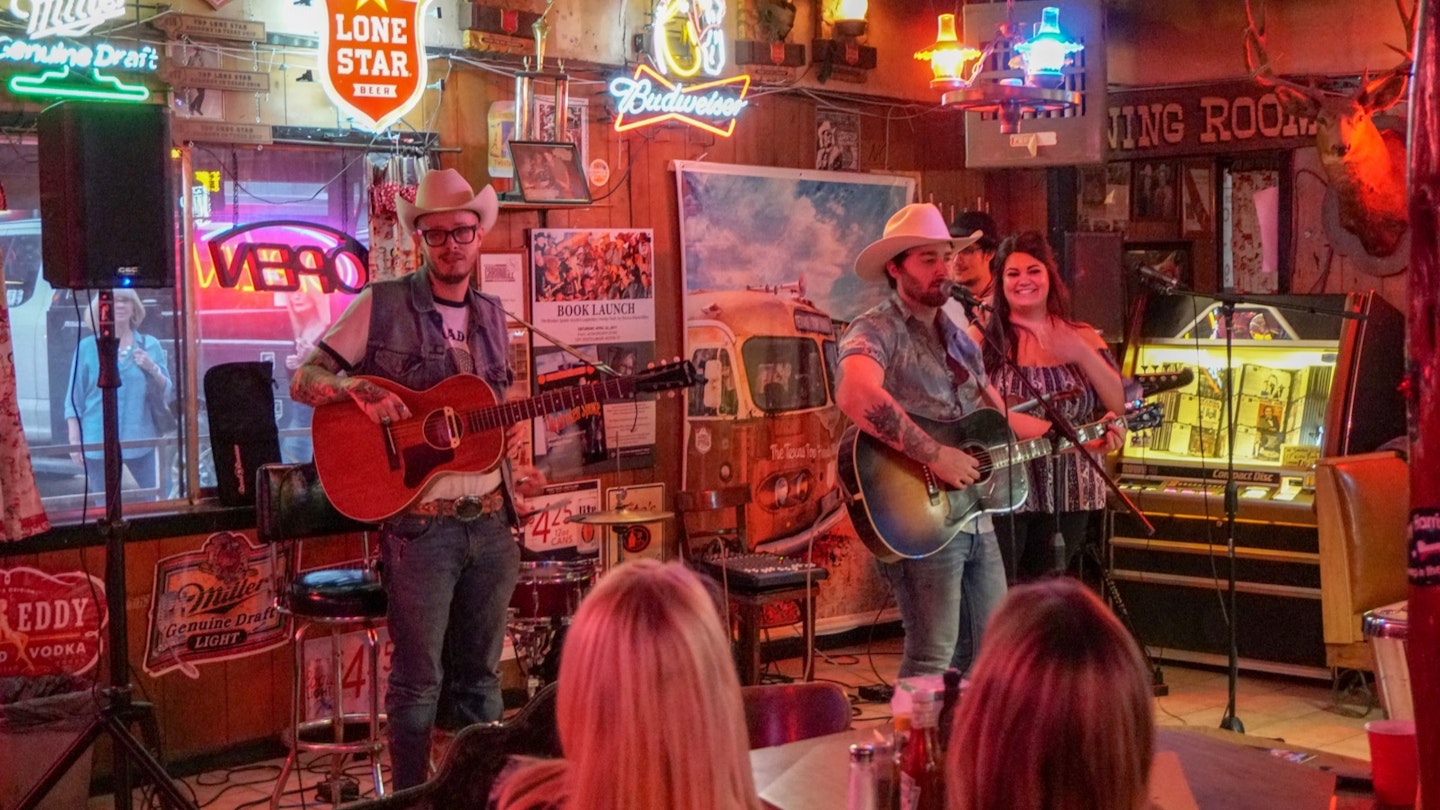Discover Texas’ Musical Heartbeat
Texas has always had a unique love affair with music. Fiddles and steel guitars are as ingrained in the fabric of the Lone Star State as blue bonnets, cowboy boots, and 20-ounce steaks.
In the first half of the 20th century, most Texans’ social lives revolved around their local dance hall. More than 1,000 venues could be found across the state at that time; however, only a fraction of those remain today. Yet, in recent years, the tradition has begun making an unexpected comeback.
“When I was growing up, (going out to the dance hall) was the thing to do,” says Mary Baker of Saint Hedwig, Texas. “Friday and Saturday night you’d go out dancing with your parents or, when you’re older, your friends. Everyone would be there, dancing with one another. Now we’re starting to see that again.”
Iconic Dance Halls in Texas
In music clubs across the state, silver-haired grandparents in cowboy hats and massive belt buckles are not only sharing the floor with tattooed hipsters; they’re often doing a two-step or a Texas waltz together. People from different generations, ethnicities, and political affiliations all enjoying music together.
The Broken Spoke
Billing itself as “the last of the true Texas dance halls,” the Broken Spoke has been an Austin mainstay for more than half a century. Bands typically play Wednesday through Saturday. Get there early to have a bite to eat and hear an up-and-coming artist play for tips in the bar. Afterward, make your way back to the dance hall, which accommodates more than 600 music fans for headliners like “London Homesick Blues” singer Gary P. Nunn. Not sure how to dance? A lesson before the headliner takes the stage will only cost you $8.
Owner James M. White is almost as much of an attraction as the place itself. He often holds court just off the bar, looking resplendent in a red sequined western shirt, white kerchief, and cowboy hat, with patrons lining up for pictures with him.
Cost: Dining room shows are free, but there’s a charge for dance-hall shows in the back.
Luckenbach
Luckenbach is synonymous with Texas music, thanks to Waylon Jennings’ classic hit. These days it’s a bit of a tourist trap, but still well worth the drive from Austin. A couple hundred people can fit under the corrugated steel roof of the open-air performing area, but at less-busy times, a few two-stepping couples share the dance floor with kids playing, while families munch on BBQ on picnic tables lining the back of the building.
On a recent day, the afternoon band – Small Town Habit – played a mix of original and covers of Steve Earle and Dixie Chicks songs, adding to the vibrant atmosphere.
Cost: Afternoon shows are typically free (the band plays for tips). Evening show tickets vary by artist.
Gruene Hall
Walking through the screen doors at Gruene Hall feels like stepping through a time portal. Established in 1878, it’s the oldest dance hall in Texas. The front bar (cash only) is filled with ancient black-and-white publicity shots of past performers. In the music hall, the warped gray tables look as though they’ve been there since day one, bearing the markings of many patrons before.
Cost: Afternoon shows are free (but the band plays for tips). Evening show ticket prices vary.
John T. Floore’s Country Store
Despite the outside sign’s promise of Willie Nelson playing every Saturday night, the Redheaded Stranger isn’t often on the bill at John T. Floore’s Country Store. Instead, sold-out houses show up to see bands like the Turnpike Troubadours, one of the hottest country-tinged rock bands on the scene today.
Opened in 1942, Floore’s Country Store has two stage areas: an 800-person capacity space inside and a massive 4,000-person amphitheater outside. During a full house, it may be challenging to move, so spring for VIP tickets if you desire personal space.
Cost: Ticket prices vary.
The Continental Club
Surprisingly small for a venue of its stature, the Continental Club is one of the last bastions of old-school Austin. Its dive-bar vibe is created by faded paintings on the wall along with regulars sipping on Lone Stars. This club has hosted numerous influential Americana musicians who perform low-key shows when they’re in town.
“You came to the right place for a good time and good music,” says Earl Poole Ball, a member of the country-music supergroup Haybale.
Cost: Cover varies.
Bonus experience: Dale Watson’s Chicken Shit Bingo
Chicken Shit Bingo is a unique Sunday tradition among local country-music lovers. A chicken coop with a grid of numbers on the floor is wheeled into the venue, and numbered tickets are sold. The waiting game is lively, as a live band entertains until the chicken “chooses” the winning number.
Cost: Free. Bingo tickets are $2 apiece.
Make the Hill Country Happen
Austin is an ideal base for a Hill Country adventure, with locations like the Paramount Theatre, an old vaudevillian house that has hosted everything from Broadway shows to classic film screenings. For a unique natural experience, check out Enchanted Rock State Natural Area, where the pink granite dome creates a beautiful, crackling sound at night.
For history buffs, the LBJ Ranch features the house where Lyndon Johnson, the 36th President of the United States, spent much time during his presidency.




